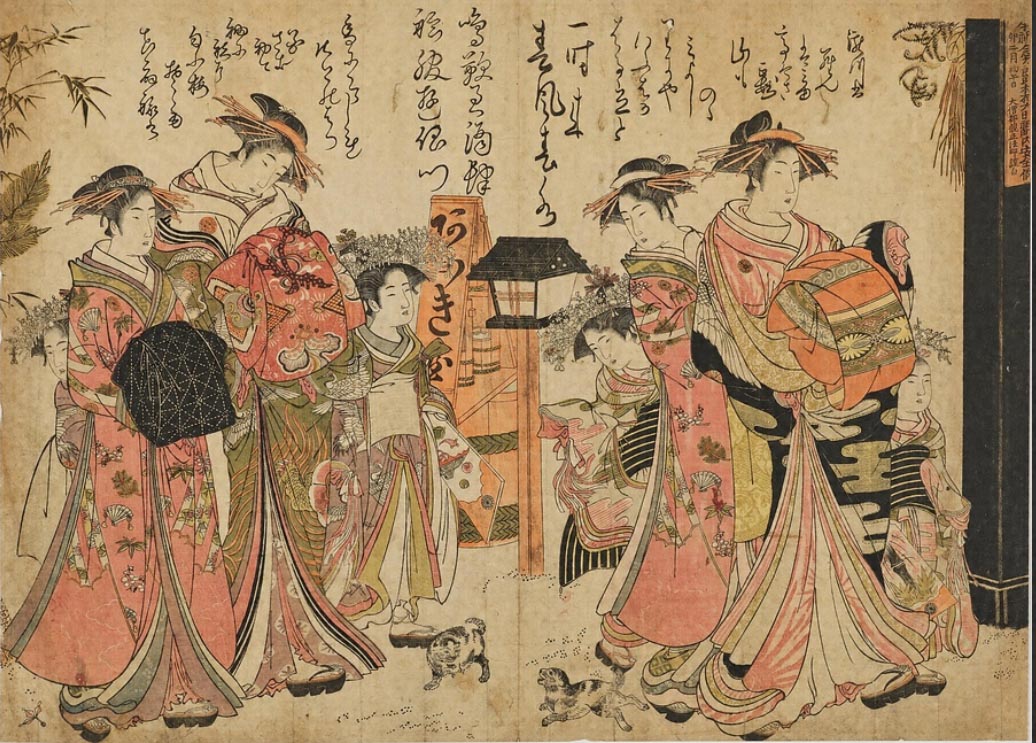[Taiga Drama Berabou] Episode 23
Aiming to become the number one publisher, the decision was made to expand into Nihonbashi. “Seirō Meikun Jishushu” was the signal for the expansion into Nihonbashi.

[Collection of Handwritten Letters of the Blue Chamber Master]
Illustrated by Kitao Masae, Publisher Tsutaya Juzaburo
Source: National Book Database
Should she go to Nihonbashi to expand her sales channels, or to Yoshiwara out of obligation to the Yoshiwara patrons who had looked after her?
Episode 23 of the historical drama “Berabou” depicts Tsutaju’s inner conflict as she decides to leave her beloved Yoshiwara and move to Nihonbashi. Tsutaju moved to Nihonbashi in 1783 (the third year of the Tenmei era).
At the time, Koshodo was booming, with sales of books like “Hama no Kisago,” a guide to kyoka poetry, soaring thanks to the booming popularity of kyoka poetry. Tsutaju was known as “Edo’s number one connoisseur,” and Koshodo became a highly sought-after publisher in Edo. At the same time, book wholesaler Suharaya Ichibei encouraged Tsutaju to move to Nihonbashi. Around the same time, Tsutaju’s nishikie print “Seiro Meigun Jishushu” (The Autobiography of a Lady in a Blue Palace) was receiving lower praise than Nishimuraya’s “Hinakata Wakana,” which left Tsutaju dissatisfied and distressed. The reason for this underestimation was Koshodo’s weak distribution capabilities, located in Yoshiwara, far from the center of Edo. Nishimuraya was located in Nihonbashi, a busy transportation hub, and received large purchases from customers outside Edo, spreading its products throughout the country. Meanwhile, Yoshiwara’s Koshodo was unknown outside of Edo, had no credibility, and was ignored by local customers. This led Tsutajyo to decide to expand into Nihonbashi. However, this angered Tsutajyo’s adoptive father, the owner of Surugaya.
“If you make a name for yourself, that’s all for you. Who do you think helped you get to this point?” the owner yelled, punching him and kicking him down the stairs. But Tsutajyo, who fell down the stairs, remained undeterred.
“If a Yoshiwara merchant from the outskirts of Edo can set up shop in the cultural heart of Edo and succeed, it will change the way people who despise Yoshiwara view him. If you rise to the top, it will be proof that a person’s origins and upbringing have nothing to do with their worth,” he persuades.
Bleeding, he climbs the stairs and approaches his father, saying, “Wouldn’t this be a way to repay the kindness of a foundling who was raised in this town, as a first-class citizen?” Personally, this scene in episode 23 was the most captivating for me. Another highlight was the escalating honey trap of the little devil, Daresode.
As if to prove that they can’t find evidence of smuggling, they should just let him do it, she uses her feminine charms, such as sex appeal and tears, to close in on Hirotoshi, the younger brother of the head of the Matsumae clan. How this all ends will likely be a major highlight. Also, in episode 23, three active makuuchi wrestlers, Wakamotoharu, Endo, and Nishikigi, appeared as sekitori in a banquet scene.
Although his appearance was short, it was a surprising casting choice.
It seems there are more surprises in store for the cast in the future, so don’t miss out!
